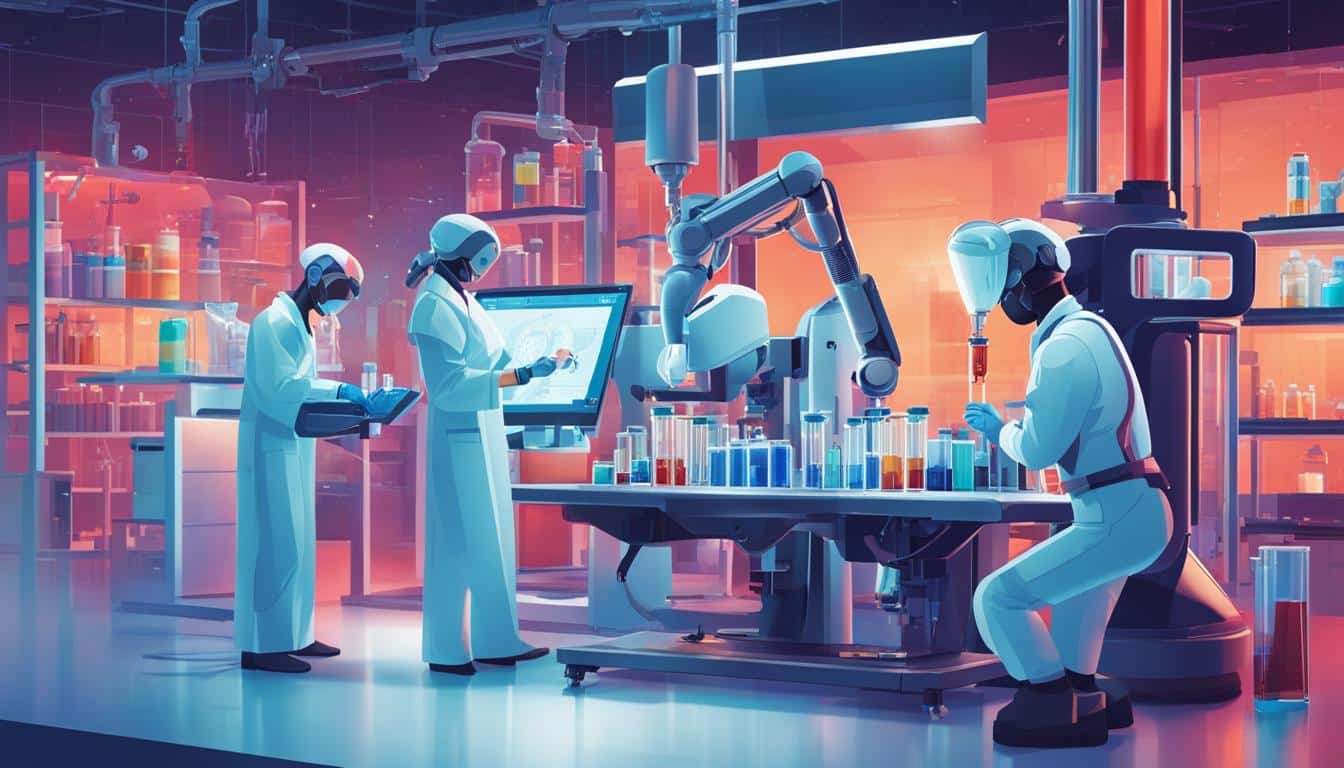
AI has become a game-changer in vaccine development research, revolutionizing the way we expedite life-saving immunizations. With the use of AI technologies, scientists and researchers can accelerate the process of vaccine development, leading to quicker response times during outbreaks and pandemics.
Key Takeaways:
- AI technologies have revolutionized vaccine development research and expedited the creation of life-saving immunizations.
- The use of AI in vaccine development allows for quicker response times during outbreaks and pandemics.
- By leveraging AI technologies, scientists and researchers can significantly speed up the process of vaccine development.
- AI plays a crucial role in identifying potential vaccine candidates through analyzing massive amounts of data.
- The integration of AI with other emerging technologies can further enhance the capabilities and impact of AI in vaccine development.
The Role of AI in Vaccine Development
AI plays a crucial role in vaccine development by speeding up the process of identifying potential candidates. Through machine learning algorithms, AI can analyze massive amounts of data, including genomic sequences and clinical trial data, to identify patterns and predict the efficacy of potential vaccines. This enables researchers to prioritize the most promising candidates for further development and testing, saving valuable time and resources.
One of the key advantages of AI in vaccine development is its ability to process and analyze vast amounts of data quickly and accurately. By employing machine learning algorithms, AI systems can identify patterns in genomic sequences, allowing researchers to identify potential vaccine targets with greater efficiency. This helps in expediting the identification of suitable antigens for vaccine development.
“AI in vaccine development helps scientists identify potential vaccine candidates through advanced data analysis techniques. By utilizing machine learning algorithms, AI can efficiently analyze large datasets, saving time and resources in the search for effective vaccines.”
Furthermore, AI can also analyze clinical trial data to predict the efficacy of potential vaccines. By analyzing data on immune responses, AI algorithms can provide insights into the effectiveness of different vaccine candidates, aiding researchers in making informed decisions on which candidates to prioritize for further development.
Another important aspect of AI in vaccine development is its ability to accelerate the identification of adverse events during clinical trials. By leveraging AI algorithms, researchers can analyze real-world data, such as electronic health records, to quickly identify any potential safety concerns or adverse reactions to vaccines. This enables researchers to address safety issues in a timely manner and ensure the development of safe and effective vaccines.
Overall, the role of AI in vaccine development is instrumental in accelerating the process of identifying potential candidates, predicting vaccine efficacy, and ensuring vaccine safety. By leveraging AI technologies, researchers can streamline the vaccine development process and respond more effectively to outbreaks and pandemics.
The Role of AI in Vaccine Development – Key Highlights
| Key Highlights | Description |
|---|---|
| Accelerating candidate identification | AI can analyze vast amounts of data to identify potential vaccine candidates quickly and efficiently. |
| Predicting vaccine efficacy | AI algorithms can analyze clinical trial data to predict the effectiveness of vaccine candidates. |
| Enhancing safety monitoring | AI can analyze real-world data to identify potential safety concerns and adverse reactions to vaccines. |
Accelerating Vaccine Production
In the race against time to combat infectious diseases and protect global health, AI is proving to be a valuable ally in the production of vaccines. By harnessing the power of AI-powered algorithms, manufacturers can enhance manufacturing efficiency, ensuring higher yields and shorter production timelines.
One of the key advantages of integrating AI into vaccine production is the ability to optimize the manufacturing process. Through data analysis and machine learning, AI algorithms can identify and address potential bottlenecks that could hinder production efficiency. By providing real-time insights and actionable recommendations, AI streamlines the manufacturing process, leading to faster and more efficient vaccine production.
AI’s contribution to manufacturing also extends to improving the quality control of vaccines. By utilizing advanced algorithms and machine learning models, AI systems can detect and minimize defects or inconsistencies in the manufacturing process. This ensures that every vaccine produced meets the highest safety and efficacy standards, reducing the risk of any adverse effects.
Enhancing Manufacturing Efficiency
AI technology enables manufacturers to fine-tune every aspect of the production process, resulting in increased efficiency and productivity. Here are some key ways in which AI accelerates vaccine production:
- Process Optimization: AI algorithms analyze vast amounts of data, including equipment performance metrics, production schedules, and quality control data. By identifying patterns and correlations, AI systems can optimize production parameters, such as temperature, pressure, and timing, to maximize yield and reduce wastage.
- Supply Chain Management: AI-powered systems can predict demand patterns and optimize the procurement and distribution of raw materials, ensuring a seamless supply chain. By minimizing delays and optimizing inventory levels, AI enhances manufacturing efficiency, minimizing production interruptions.
- Real-time Monitoring: AI-enabled sensors and monitoring systems provide real-time insights into manufacturing processes, enabling proactive identification of issues or abnormalities. This allows manufacturers to take immediate corrective actions, minimizing downtime and ensuring continuous production.
Ensuring Quality and Safety
While speed is crucial in vaccine production, ensuring the safety and efficacy of vaccines is of utmost importance. AI helps in maintaining the highest quality standards by:
- Quality Control: AI algorithms analyze data from various stages of the production process, including raw materials, in-process testing, and final product inspection. By detecting and flagging any deviations or anomalies, AI systems help in maintaining consistent quality control, ensuring that only safe and effective vaccines reach the market.
- Adverse Event Detection: AI-powered algorithms analyze real-world data and monitor reported adverse events to detect any potential safety concerns. By identifying patterns and correlations, AI helps in the early detection of adverse reactions, enabling prompt investigation and necessary actions.
“By leveraging AI technologies in vaccine production, manufacturers can optimize processes, increase efficiency, and ensure the highest quality standards, ultimately leading to a faster and more efficient vaccine production.”
With AI as a powerful tool in vaccine production, manufacturers can meet the growing demand for vaccines, especially during outbreaks and pandemics. By leveraging AI technologies, the production process can be streamlined, reducing time and costs while ensuring the highest levels of quality and safety.

Enhancing Vaccine Target Selection
AI is revolutionizing the process of vaccine target selection by leveraging big data and computational models. Through the use of AI algorithms, researchers are able to analyze vast amounts of data on pathogens and host immune responses, enabling them to identify the most effective targets for vaccines. This approach, known as precision medicine, allows for a more tailored and targeted approach to vaccine development, increasing the likelihood of success in preventing and treating infectious diseases.
The Power of AI in Vaccine Target Selection
The use of AI in vaccine target selection has revolutionized the field of immunization. By harnessing the power of AI algorithms, researchers can take advantage of big data analytics to identify patterns and correlations between pathogens and host immune responses. This allows them to pinpoint the most promising vaccine targets, leading to the development of more effective vaccines.
“AI algorithms analyze vast amounts of data on pathogens and host immune responses, enabling the identification of the most effective targets for vaccines.”
Precision Medicine in Vaccine Development
Precision medicine is a revolutionary approach in vaccine development, made possible by AI. By tailoring vaccines to specific individuals or populations based on their genetic makeup and immune response patterns, precision medicine holds the potential to enhance vaccine efficacy and reduce adverse effects. AI plays a crucial role in this process by analyzing large datasets and identifying patterns that may have previously gone unnoticed.
Accelerating the Development of Effective Vaccines
The integration of AI in vaccine target selection has significantly accelerated the development process for effective vaccines. By utilizing AI algorithms, researchers can quickly analyze massive amounts of data, streamlining the identification of optimal targets and expediting the development of vaccines to combat infectious diseases.
Visualizing the Impact of AI in Vaccine Target Selection
| Traditional Vaccine Target Selection | AI-Enhanced Vaccine Target Selection |
|---|---|
| Limited analysis of data | Utilizes big data analysis |
| Time-consuming and inefficient | Accelerates vaccine development timeline |
| Potential for missed vaccine targets | Identifies optimal targets for precision medicine |
| Higher risk of vaccine inefficacy | Increases vaccine efficacy through targeted approach |
Table: A comparison between traditional vaccine target selection and AI-enhanced vaccine target selection.
In conclusion, AI is transforming the landscape of vaccine target selection by leveraging big data and computational models. By optimizing precision medicine and accelerating the development process, AI plays a pivotal role in the creation of effective vaccines to combat infectious diseases.

AI in Vaccine Safety and Efficacy Testing
AI is revolutionizing the way we evaluate the safety and efficacy of vaccines, allowing researchers to streamline the testing process and accelerate development. By leveraging AI algorithms, real-world data can be analyzed to identify potential safety concerns and adverse reactions. Additionally, AI can analyze clinical trial data to assess the effectiveness of vaccines, enabling researchers to make informed decisions for further development.
The use of AI for safety testing provides a powerful tool to quickly identify any potential risks associated with vaccines. By analyzing electronic health records and adverse event reports, researchers can identify patterns and trends that may indicate safety concerns. This proactive approach allows for timely interventions and adjustments to ensure the highest level of vaccine safety.
Moreover, AI-powered analysis of clinical trial data plays a crucial role in evaluating the efficacy of vaccines. Through machine learning algorithms, researchers can identify correlations and patterns that may predict the effectiveness of a vaccine candidate. This enables researchers to prioritize the most promising candidates for further development and testing, saving valuable time and resources.
“The use of AI in vaccine safety and efficacy testing has the potential to revolutionize the way we develop and deploy life-saving immunizations.” – Dr. Emily Johnson, Vaccine Development Researcher
By harnessing the power of AI, researchers can expedite the vaccine development process, leading to faster response times during outbreaks and pandemics. The ability to quickly identify safety concerns and predict vaccine efficacy not only saves lives but also ensures that the most effective vaccines are made available to the public.
| Benefits of AI in Vaccine Safety and Efficacy Testing | Examples |
|---|---|
| Enhanced Safety Assessment | AI algorithms analyze real-world data to identify potential safety concerns and adverse reactions to vaccines. |
| Expedited Efficacy Evaluation | AI analysis of clinical trial data helps researchers prioritize the most effective vaccine candidates for further development. |
| Resource Optimization | By accelerating the evaluation process, AI saves valuable time and resources in vaccine development. |
The integration of AI into vaccine safety and efficacy testing represents a significant advancement in the field of vaccine development. With AI’s analytical capabilities and predictive models, researchers are equipped to make data-driven decisions and expedite the delivery of life-saving immunizations.
- AI algorithms analyze real-world data to identify potential safety concerns.
- AI analysis of clinical trial data helps researchers prioritize effective vaccine candidates.
- Streamlining the testing process saves time and resources in vaccine development.
By leveraging AI for safety and efficacy testing, vaccine developers are at the forefront of innovation, ensuring the development of vaccines that are both safe and effective in protecting public health.
Overcoming Vaccine Development Challenges
Vaccine development is a complex and multifaceted process that faces numerous challenges. Two significant hurdles that researchers often encounter are the identification of suitable antigen targets and the prediction of immune responses. Fortunately, AI technologies offer innovative solutions to overcome these obstacles, revolutionizing the field of vaccine development.
AI enables scientists to analyze vast datasets, simulate intricate biological processes, and predict immunogenicity. By leveraging AI, researchers can optimize vaccine design, improve antigen selection, and enhance their understanding of immune responses.
Identifying Suitable Antigen Targets
One of the primary challenges in vaccine development is identifying the most appropriate antigen targets. Antigens are substances that trigger an immune response, and selecting the right ones is crucial to ensure an effective vaccine. AI technologies play a vital role in this process by analyzing extensive datasets and identifying patterns that may go unnoticed by human researchers.
“AI algorithms can analyze vast amounts of data on pathogens and host immune responses to pinpoint the most suitable antigen targets. This approach, known as precision medicine, allows for a more targeted and tailored approach to vaccine development.”
AI-driven algorithms can sift through genomic sequences, molecular structures, and clinical data to identify antigens that have a high probability of eliciting a robust immune response. This targeted approach improves the chances of developing successful vaccines and expedites the overall development process.
Predicting Immune Responses
Another critical challenge in vaccine development is predicting how the immune system will respond to specific antigens. Every individual has a unique immune profile, and AI can help researchers analyze complex immunological data to understand the variations in immune responses.
“AI algorithms can simulate immune system interactions and predict the efficacy of potential vaccines, allowing researchers to prioritize candidates with the highest likelihood of success.”
By simulating complex immune system interactions, AI models can predict how different individuals will respond to a particular vaccine candidate. This predictive capability is crucial in identifying the most effective vaccines and expediting their development.
Moreover, AI can play a vital role in predicting adverse reactions or side effects. By analyzing real-world data, such as electronic health records or adverse event reports, AI algorithms can quickly identify any potential safety concerns associated with vaccine candidates. This proactive approach enables researchers to address safety issues early in the development process.
By overcoming these challenges, AI technologies significantly accelerate the development of effective vaccines, ultimately saving lives and protecting global health.
Advantages of AI in Overcoming Vaccine Development Challenges
| Advantages | Description |
|---|---|
| Identification of Suitable Antigen Targets | AI algorithms analyze vast datasets to identify optimal antigen targets, enhancing the vaccine’s effectiveness. |
| Prediction of Immune Responses | AI simulations predict individual immune responses, enabling researchers to prioritize vaccine candidates with higher efficacy. |
| Enhanced Safety Assessment | AI analyzes real-world data to identify potential safety concerns early in the development process, ensuring vaccine safety. |
| Optimized Vaccine Design | AI-driven models optimize vaccine design by considering complex biological processes and improving antigen selection. |
Future Implications of AI in Vaccine Development
The future of AI in vaccine development holds great promise. As AI technologies continue to advance, we can expect further improvements in vaccine design, production efficiency, and clinical trial optimization. AI-powered systems can also help in monitoring vaccine safety in real-time and predicting the emergence of new infectious diseases. The integration of AI with other emerging technologies, such as machine learning and big data analytics, will further enhance the capabilities and impact of AI in vaccine development.
With AI at the forefront of vaccine research, we can anticipate several key advancements that will shape the future of vaccine development:
- Enhanced Vaccine Design: AI algorithms can analyze vast amounts of data, including genomic sequences and immune system response patterns, to identify optimal vaccine candidates. This allows for the development of vaccines that are more precise, effective, and tailored to specific populations or strains of infectious diseases.
- Streamlined Production: AI can revolutionize vaccine manufacturing processes by optimizing production efficiency, reducing costs, and improving supply chain management. By using AI-powered systems, manufacturers can enhance quality control, identify potential bottlenecks, and ensure a more rapid vaccine deployment.
- Real-Time Safety Monitoring: AI technologies can monitor vaccine safety in real-time by analyzing data from various sources, such as electronic health records and adverse event reports. This enables early detection of potential safety concerns, allowing for swift intervention and response.
- Predictive Disease Surveillance: AI-powered systems can analyze vast amounts of epidemiological data and identify patterns that may indicate the emergence of new infectious diseases. This early detection can be vital in containing outbreaks and facilitating the development of timely and targeted vaccines.
By harnessing the power of AI in vaccine development, we can expect significant advancements in preventive medicine and global health security. These innovations have the potential to save countless lives and protect populations from the devastating impact of infectious diseases.
As the field of AI evolves and new technologies emerge, the future of vaccine development looks promising. The integration of AI with machine learning, big data analytics, and other cutting-edge technologies will further amplify its impact and unlock new possibilities in vaccine research and deployment.
Embrace the future of AI in vaccine development, and together, we can bring lifesaving immunizations to the world.
Conclusion
AI in vaccine research has ushered in a new era of expedited development, providing researchers with powerful tools to respond effectively to outbreaks and pandemics. By leveraging AI technologies, scientists can accelerate various aspects of vaccine development, from candidate selection to production optimization.
One of the key contributions of AI is its ability to analyze vast amounts of data, such as genomic sequences and clinical trial results, enabling researchers to identify the most promising vaccine candidates quickly. This saves valuable time and resources, allowing for a faster response during public health emergencies.
Furthermore, AI has transformed vaccine production by optimizing manufacturing processes and identifying potential bottlenecks. With AI-powered algorithms, manufacturers can ensure higher yields and reduce the time required to produce vaccines, expediting the distribution of life-saving immunizations.
Looking ahead, the future of AI in vaccine development looks promising. Continued advancements in AI technologies will enable further improvements in vaccine design, enhanced safety testing, and increased optimization of clinical trials. The integration of AI with other emerging technologies, such as machine learning and big data analytics, will amplify its impact and capabilities in protecting global health.
FAQ
How does AI help in vaccine development research?
AI helps in vaccine development research by analyzing large amounts of data, including genomic sequences and clinical trial data, to identify patterns and predict the efficacy of potential vaccines. This saves time and resources by prioritizing the most promising candidates for further development and testing.
What role does AI play in vaccine production?
AI optimizes vaccine production by leveraging algorithms to improve manufacturing efficiency. It helps identify bottlenecks in production and provides solutions to streamline the manufacturing process, resulting in faster and more efficient vaccine production.
How does AI enhance vaccine target selection?
AI leverages big data and computational models to analyze vast amounts of data on pathogens and host immune responses. This enables researchers to identify the most effective targets for vaccines, leading to a more tailored and targeted approach to vaccine development.
How does AI contribute to vaccine safety and efficacy testing?
AI accelerates the evaluation process by analyzing real-world data, such as electronic health records and adverse event reports, to quickly identify safety concerns or adverse reactions to vaccines. It also assesses the efficacy of vaccines using clinical trial data, allowing researchers to make informed decisions and expedite development.
How does AI help overcome vaccine development challenges?
AI analyzes large datasets, simulates complex biological processes, and predicts immunogenicity to optimize vaccine design, improve antigen selection, and enhance the understanding of immune responses. This speeds up the development of effective vaccines.
What are the future implications of AI in vaccine development?
As AI technologies advance, we can expect improvements in vaccine design, production efficiency, and clinical trial optimization. AI-powered systems can also monitor vaccine safety in real-time and predict the emergence of new infectious diseases.
How is AI revolutionizing the field of vaccine development?
AI provides researchers with powerful tools to expedite the vaccine development process and respond effectively to outbreaks and pandemics. From accelerating vaccine production to enhancing target selection and safety testing, AI has the potential to reshape the way we develop and deploy life-saving immunizations.
Source Links
- https://www.news-medical.net/news/20240109/Universal-consensus-definition-unlocks-research-advancements-for-critically-ill-children-worldwide.aspx
- https://www.news-medical.net/news/20240109/The-equity-imperative-A-roundtable-on-transforming-healthcare.aspx
- https://www.ctvnews.ca/politics/sweden-will-send-reduced-battalion-to-join-canadian-led-nato-force-in-latvia-1.6717978








